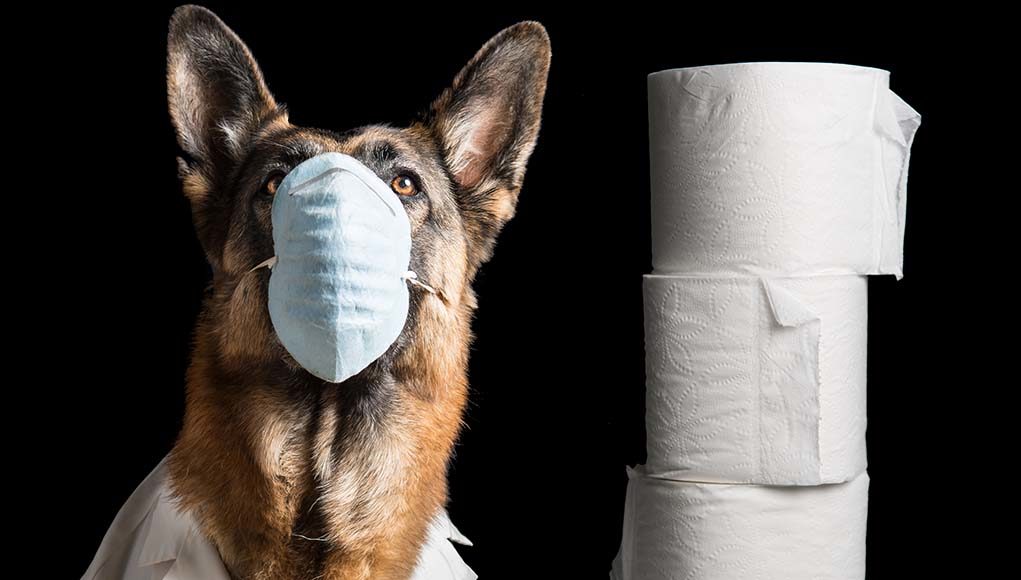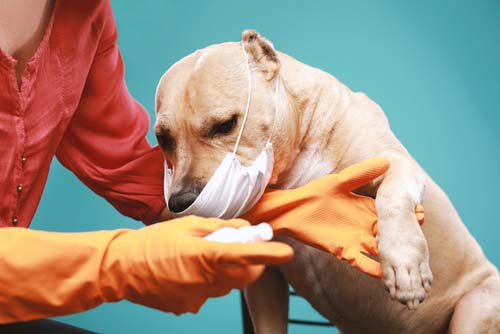The ongoing coronavirus pandemic is affecting people all across the globe. COVID-19 is a novel virus and there are still a lot of things we don’t know about it. However, there are also many facts that we do know, and so here are some useful tips for pet owners to prepare and deal with Covid-19.
Table of Contents
1. Keep Yourself Safe
The best way to keep your dogs safe is by keeping yourself safe. Right now, there is no cure or prevention for COVID-19, no treatments and no vaccines, their for humans nor for dogs or other animals.
If you contract coronavirus, your body will have to fight the disease on its own. And while most people only have mild symptoms or can even be completely asymptomatic, a small percentage of infected develop pneumonia-like symptoms and require medical assistance.
With that in mind, prevention is the best way to fight COVID-19. If you keep yourself healthy, you will also be able to protect your pet. In order to minimize the risk of contracting coronavirus, stick to these instructions from health officials:
- Wash Your Hands Often – Use water and soap to wash your hands and do it for at least 20 seconds.
- Use Hand Sanitizer – If you can’t wash your hands, you can use hand sanitizer. Make sure that it contains at least 60% alcohol.
- Don’t Touch Your Face – Unless your hands are clean, avoid touching your eyes, nose, and mouth.
- Clean and Disinfect Your Home – Make sure that you clean and disinfect frequently touched surfaces on a daily basis.
- Maintain Social Distancing – Whenever you are in public, try to maintain a distance of at least 6 feet from other people.
- Minimize Social Interactions – You have probably heard the term “social distancing” by now. It means that you should stay at home whenever you can during the outbreak and only engage in live social interactions when it is absolutely necessary.
2. Keep Your Pet Safe
Overwhelming evidence, at this time, suggests that companion animals, dogs and cats included, are more or less immune to COVID-19. Currently, scientists are saying that coronavirus that is spreading among humans cannot be transferred onto pets.
However, there have been a few rare cases of dogs and cats contracting the virus, such as these two dogs in Hong Kong and one cat in Belgium that were suspected to have contract the same strain of coronavirus. So far, these were the only cases of human-to-animal transmission and all of them were asymptomatic, and likely exceptions to the rule.
So, while the chances of your dog getting coronavirus are low, you can take certain precautions to minimize the risk, especially if you have been tested positive for COVID-19 or expect a high chance of being infected even if you haven't been tested yet.
Restrict contact with your pet: no petting, licking, kissing, sharing food, etc. Also, make sure to always wash your hands before and after you touch your dog, your dog's food and other pet supplies. During the outbreak, it is advisable to avoid touching your pet’s face in general, particularly their mouth and nose.
You don’t have to worry about your dog transmitting the virus to you or other humans, since there is no evidence that animal-to-human transmission is actually possible at the moment. That said, this is a new virus and one that could mutate in the future, so stay informed about any potential developments.
Remember that conspiracy theorists are spreading a lot of misinformation about what coronavirus is or isn't, what it does and what it doesn't. Make sure to only stick to and use official and reliable evidence-based sources from health experts and based on scientific research, such as World Health Organization (WHO) or Centers for Disease Control and Prevention (CDC).
3. Prepare an Emergency Kit
In an emergency like the COVID-19 outbreak, it's advisable for pet owners to be prepared for any other emergency developments. Make sure you have an emergency kit prepared for your pets, at the very least a dog first aid kit.
Other things to consider for your dog's emergency kit are month’s supply of your pup's medications, as well as at least a couple of weeks worth of dog food and other pet necessities. You should also have crate(s) on hand if you need to relocate your pet quickly. Samantha shared more tips here on how to keep dogs safe during this pandemic.
Your pet should always have ID tag on their collar, and they must have been updated with current information and include the dog's name, your phone number and medical history. You can find more detailed instructions and tips on how to prepare coronavirus emergency kit for your pet on the CDC website here.
4. Designate an Emergency Caregiver
You need to be prepared for any situation, especially not being able to care for your pet if you have to self-isolate or go to a hospital. That’s why you should designate an emergency caregiver, like a family member, a friend, a neighbor, or a boarding facility or dog walker/sitter that can take care of your pooch for a while.
Make sure that the emergency caregiver has all the necessary information about caring for your pet. To make it easier for them, compile a “pet dossier” in which you will list your pet’s food preferences, medical conditions along with medications being taken, a dog's habits, behavior and so forth. Include your vet’s contact info and your pet’s medical and vaccination records. Keep this list in or near your dog's emergency kit or first aid kit.
Conclusion
Taking care of a dog during the coronavirus pandemic requires good preparation for any possible situation but the most important thing is to keep yourself and your pet safe and away from danger, particularly if you're already aware of things to avoid.
It is also important to have a pet emergency kit ready in case you'd need to relocate yourself or your dog quickly, and you should also designate an emergency caregiver who can help if you are unable to care for your dog in case you become infected.
READ NEXT: 7 Ways to Save Money On Pet Supplies During COVID-19 Pandemic















